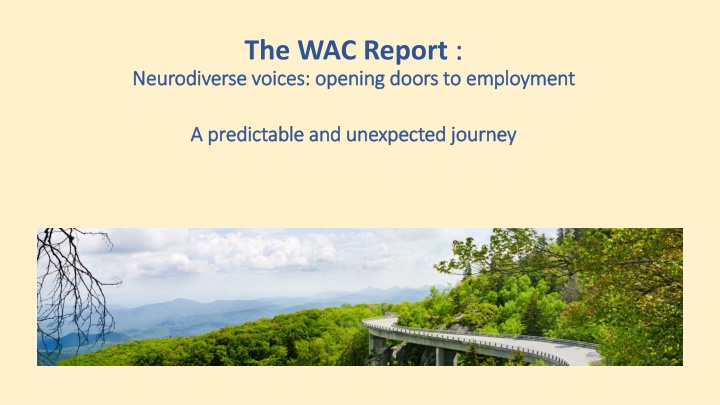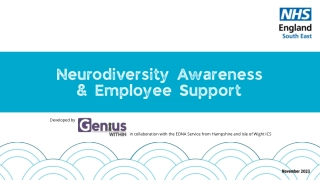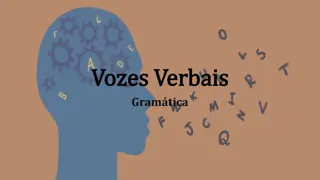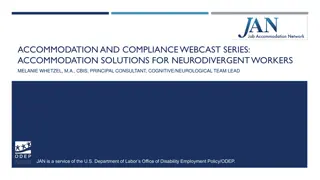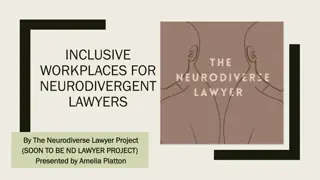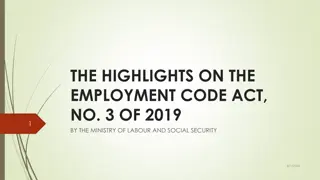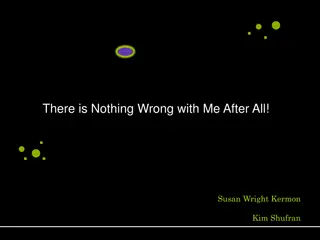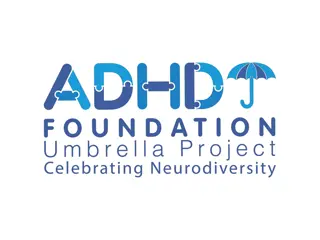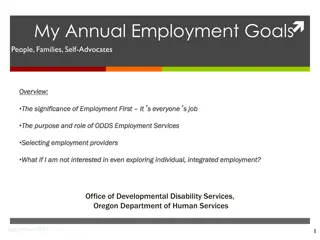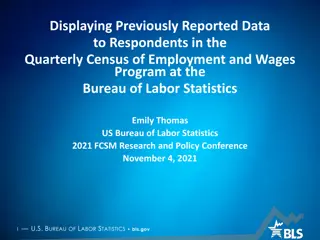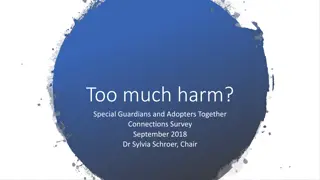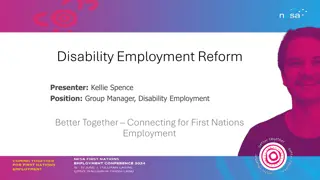Voices in Employment: Neurodiversity Research Report Findings
The Westminster AchieveAbility Commission's report delves into employment barriers for neurodiverse individuals, highlighting discrimination and challenges faced during the hiring process. Key findings reveal reluctance to disclose neurodivergence, experiences of discrimination, and the need for better support systems. The research emphasizes the importance of fostering neurodiverse voices and creating inclusive work environments.
Download Presentation

Please find below an Image/Link to download the presentation.
The content on the website is provided AS IS for your information and personal use only. It may not be sold, licensed, or shared on other websites without obtaining consent from the author.If you encounter any issues during the download, it is possible that the publisher has removed the file from their server.
You are allowed to download the files provided on this website for personal or commercial use, subject to the condition that they are used lawfully. All files are the property of their respective owners.
The content on the website is provided AS IS for your information and personal use only. It may not be sold, licensed, or shared on other websites without obtaining consent from the author.
E N D
Presentation Transcript
The WAC Report : : voices: opening doors to employment Neurodiverse Neurodiverse voices: opening doors to employment A predictable and unexpected journey A predictable and unexpected journey
Westminster AchieveAbility Commission (WAC) Westminster AchieveAbility Commission (WAC) AchieveAbility in collaboration with the BDA, Dyspraxia Foundation and Dyslexia Adult Network (DAN). Lord Addington - Advisor. Barry Sheerman MP - Chair Why? To investigate the barriers to employment To identify good and bad practice in recruitment Govt target of one million disabled people employed by 2020.
Enthusiasm of participation Enthusiasm of participation Neurotypical voices Neurodivergent voices Neurodiverse expert voices
How have we done this? How have we done this? 4 face to face evidence sessions at the House of Commons (40 people): The Experts (ACAS- BDA- Microlink) The Employers (BBC- TFL-T.Rowe Price-Exceptional individuals- Key4Learning) The ND voice (40 people) The DWP (Access to Work)
How have we done this? How have we done this? During: 2016-2017 data collection Report published 2018 2 surveys sent out over three months The ND survey returned over 600 responses The employers survey returned 30 responses
Key headlines of the report 43% of surveyed respondents felt discouraged from applying by the job application processes 52% claimed they had experienced discrimination during interview or selection processes 73% did not disclose during interview 58% regretted disclosing and felt this led to discrimination
Only a minority have one label of Only a minority have one label of neurodivergence Ross Cooper) Ross Cooper) neurodivergence ( Dr ( Dr 35 Dyslexic % overlap Dyslexia 30 25 20 1 Label 15 10 2 Labels 5 0 3+ labels Dyspraxic Dyscalculic autistic AD(H)D Dysgraphic OCD Tourettes 60 Dyspraxia Dyspraxic % overlap 40 20 0 Dyslexic Dyscalculic autistic AD(H)D Dysgraphic OCD Tourettes Autism 35 Autistic % Overlap 30 25 20 15 10 5 0 Dyslexic Dyspraxic Dyscalculic AD(H)D Dysgraphic OCD Tourettes
Disabled from applying increases with increased neurodivergence 100% Consistency of message Consistency of message 90% 80% 70% 60% 50% 40% the experience is even worse than we thought wasting talent need better measurement of job skills and abilities selection processes to evaluate how neurotypical the candidate is, rather than how suitable for the job 30% 20% 10% 0% 1 Label 2 Labels 3+ Labels Always Usually Sometimes No Lack of confidence also increased with minority ethnicity 100% 90% 80% 70% 60% 50% 40% 30% 20% 10% 0% Dr Ross Cooper Min. Ethnicity always usually Sometimes No
The importance of an understanding, well The importance of an understanding, well- -informed manager Dr Ross Cooper Dr Ross Cooper informed manager Always 1% Manager understands neurodivergence Usually 2% Sometimes 24% No 73%
Experienced discrimination during selection Disclosure is Disclosure is dangerous dangerous Dr Ross Cooper Dr Ross Cooper Yes 28% No 48% Disclose during selection Regret Disclosure Sometimes 24% always 20% Yes 26% No 35% No 42% Experienced discrimination in work usually 16% Sometimes 32% No 31% Sometimes 29% Yes 44% Sometimes 25%
Feel disabled by psychometric tests Need to change the system, Need to change the system, rather than simply rely on rather than simply rely on 'reasonable adjustments 'reasonable adjustments (Dr Ross Cooper) (Dr Ross Cooper) No 20% always 37% Do you feel able to demonstrate your skills in the selection process? Do you feel that selection processes are fair and provide equal opportunities? usually 18% Sometimes 25% Always 3% Always 1% Usually 12% Usually 16% Are employers happy to make reasonable adjustments during the selection process? No 39% No 46% Always 3% Usually 17% No 36% Sometimes 42% Sometimes 41% Sometimes 44%
Bullet pointing text is extremely important Dr Ross Cooper % Preferring bullet points increases with increased neurodivergence 100 90 80 70 60 50 40 30 20 10 0 1 Label 2 Labels 3+ Labels
10 Barriers to employment identified 10 Barriers to employment identified Barrier 1 Lack of awareness at all levels- Managers- HR- Workers- Government offices Barrier 2 The consequences of disclosure- Discrimination- stress-lack of progression-range of tasks Barrier 3 Government measures are inadequate- Access to Work- Disability Confident under-resourced. Job Centre Plus restructuring Barrier 4 Reasonable adjustments are often poorly conceived Social model not followed- rather remediation of deficit
10 Barriers to employment identified ( 10 Barriers to employment identified (cont cont) ) Barrier 5 Equality Act is not being adequately implemented Difficult to secure legal protection- stressful- expensive Barrier 6 Psychometric tests disable neurodivergent applicants Overly complex- disable- unreliable Barrier 7 Recruitment and selection procedures require literacy working memory overload- more difficult than actual job
10 Barriers to employment identified ( 10 Barriers to employment identified (cont cont) ) Barrier 8 Recruitment and selection procedures poorly conceived working memory overload- lack of assistive technology Barrier 9 Selection and Progression depends on being neurotypical expected employee characteristics- not fitting in the culture Barrier 10 Performance management that is not applicable for the ND - Lack of awareness leads to treating ND employees as the problem
8 Main Recommendations: 8 Main Recommendations: 1 Awareness Training programmes CIPD to set in place training- ND champions- HR staff- senior managers -Policy makers 2 DWP good practice recruitment guide To include a broad spectrum of conditions- social model 3 Jobcentre Plus Sanctions- ND advisers to JCP- training 4 Access to Work Monitoring- promotion- no diagnostic assessments
8 main recommendations (cont) 5 Disability Confident To be promoted - monitored- incentives- continuous- data 6 Accessibility of written employment information Plain English- bullet points-assistive technology- spell checkers 7 Reasonable Adjustments Ask the employee- clear processes- no tick box on disclosure but menu of reasonable adjustments to select 8 Psychometric and other tests End use in selection- move to evaluating a range of strengths rather than weaknesses- practical assessments
The WAC Report Journey: The WAC Report Journey: opening doors to employment for a opening doors to employment for aneurodiverse neurodiverse society society Special thanks go to: Dr Ross Cooper- Craig Kennady -Melanie Jameson- Richard Todd Katherine Hewlett
